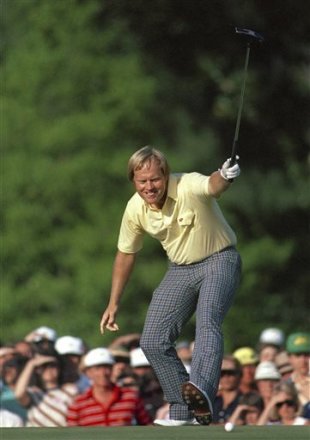Tiger running out of time to catch Jack? Maybe not

Dan Wetzel April 10, 2013 4:53 PMYahoo Sports
AUGUSTA, Ga. – Whenever Jack Nicklaus is asked about the possibility of Tiger Woods surpassing his record of 18 major championships, it's common for The Golden Bear to shoot the slightest bit of trash talk.
It always starts positive:
"I still expect him to break my record. I think he's just too talented, too driven and too focused on that …"
And then winds up with a cautionary barb:
"… Still, he's got to do it."
Or later when Nicklaus was told it's been nearly five years since Tiger last won a major – the 2008 U.S. Open:
"Really?" Nicklaus said. "A bit further away. I mean it's been awhile. He's going to have to figure it out."
Or when Nicklaus notes the importance of seizing every opportunity, such as this very weekend at the Masters:
"If he doesn't figure it out here, I think it will be a lot tougher for him."
All good and harmless stuff from a 73-year-old who has no other means of defense. None of this was new when Jack broke into routine this week at Augusta National.
View gallery.

Jack Nicklaus reacts to a birdie on the 17th hole at Augusta en route to major win No. 18 in 1986. (AP)It's what else Nicklaus said that, while garnering less attention, suggests that Tiger's window for winning majors – he's been sitting on 14 since that U.S. Open win in '08 – will remain open longer than once believed.
Nicklaus was discussing his last major title. It was his 1986 victory at Augusta. It came at the age of 46 and was his first major since the 1980 PGA Championship. Only Julius Boros (at 48 at the 1968 PGA Championship) won a major at an older age.
As such, 46 has been seen as an unofficial end game for Woods, a time when age will inevitably catch up to him. Since Woods is now 37, speculation is that he has precisely 10 years, or 40 majors, to win five more times. Then he'd be too old.
However, Nicklaus said one of the reasons he stopped winning in his 40s wasn't a deterioration of his skills, but a lack of drive and interest in preparation.
"I don't know whether my skills were all that diminished at 46," Nicklaus said. "I don't think your skills are really diminished. It's more my desire and desire to work hard and prepare. Because I said I'd prepare but I didn't prepare quite as hard as I normally would. So I never thought that, you know, I was deteriorated yet. I don't think I was quite old enough for the wheelchair yet.
"I mean, I was just playing a dozen tournaments a year. I was just going through the motions."
If that's the case, then the long-settled upon window for Woods to catch and surpass Nicklaus may be too small.
[Related: Tianlang Guan, 14, will be the youngest player in Master's history]
Tiger is, at the very least, the most talented golfer since Nicklaus. And if Nicklaus could maintain his skills at 46 without working hard, then why can't Tiger go even older?
Moreover, it is highly unlikely that Tiger will ever, ever lose his desire to win or his commitment to physical and mental preparation. While Nicklaus slept-walked through some chances, Tiger will attack every one of those 40 opportunities.
Extending the all-time major championship mark was not a priority for Nicklaus after 1980. He had 17 at the time; six more then Walter Hagen, who was second at the time but passed away in 1969. Third place was a tie at nine between Gary Player and Ben Hogan.
There was no true threat on the horizon – contemporary Tom Watson would finish with eight. And there was no way to imagine a force of nature such as Woods coming along to challenge the mark.
What Jack was suggesting – perhaps on purpose – is that if he wanted, he could've remained a high-level player on the tour deep into his 40s. Instead he was bored so he went into a semi-retirement.
"Well, I [could] always win," Nicklaus said. "But I didn't play very much. I don't know why I was playing. I really sort of finished my career, basically, in 1980, and … I just happened to like to play golf and I wanted to be part of it and a few other things.
"I was doing more golf course design and watching my kids play football, basketball or baseball or golf or whatever it may be. And I was frankly enjoying my life."
So maybe Tiger's career clock isn't ticking as loudly as some believe. The "some" includes Nicklaus.
"Obviously the older he gets and if he doesn't win, it makes my record move out further," Nicklaus said. "From this point he's got to win five majors, which is a pretty good career for most people." [Indeed, only 18 golfers have ever won that many; Phil Mickelson, for all his ability, has won four.]
Age is said to be a big factor here. Nicklaus went so far as to say Woods was 38. When he was corrected that Tiger was just 37, Jack smiled.
"[He's] in his 38th year."
Even Tiger seems to have embraced the idea that the age of 46 is a potential cut-off.
"It took Jack a while to get to 18, all the way until he was 46 years old," Woods said. "So there's plenty of opportunities for me."
Really, though, there may be not just even more opportunities than Tiger realizes, but a higher yield in the meantime. Nicklaus essentially wrote off years he could've padded his total.
While Tiger may decide he wants to cut back and also spend time watching his children grow up, it's far more likely he'll remain every bit as focused as he currently is.
He is a testament to preparation, both physical and mental. He remains committed to practice. And with the obvious goal that Nicklaus lacked – someone to pass on the all-time majors list – there is reason to continue on and on.
Yes the competition continues to improve and injuries always loom, but whether Jack realized it or not when he was telling stories here this week, he showed how the oft-established window of Woods could be improperly calculated.
And while a winning a major championship ASAP would be welcome for Tiger, it may not be as imperative as some believe to eventually break that record.


